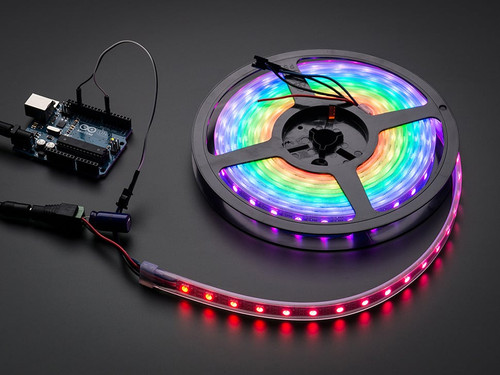
NeoPixel Digital RGB LED Strip - Black 60 LED - BLACK - 4 meters (full reel)
| SKU: | 1461-1 |
You thought it couldn't get better than our world-famous 32-LED-per-meter Digital LED strip but we will prove you wrong! You wanted twice the LEDs? We got it (well, it's 1.875 times as many but that's within a margin of error). You wanted thinner strips? Now only 12.5 mm wide, 10 mm if you remove the strip from the casing. You wanted less noticeable strip color - this strip has black-colored flex PCB, which will be less visible against black-painted walls. This is the strip with black flex PCB, it's identical to the white 60 LED/meter except it has a different color mask on the flex strip.
All your dreams answered, yet there are a few things to watch for.
- First up, the higher density means much higher power usage over a certain distance - 18 Watts max (~3.5 Amps @ 5V) per meter instead of 9.6 Watts max (~2 Amps @ 5V). The max rating is assuming all the LEDs are on full white, usually the actual current for colorful design is about 1/3 to 1/2 the max current. A good power supply such as our 5V 10A supply is key!
- Second, to get high density, the controller chip is inside the LED, which is kind of cool, but also means that the chip only uses a single pin for input and a single pin for output. The protocol used is very very timing-specific and can only be controlled by microcontrollers with highly repeatable 100nS timing precision. We have example code for using with the Arduino Uno/Mega microcontroller at 8MHz and 16MHz, and with a little effort you can use with the Raspberry Pi, or Beagle Bone Black, but it will not work with the Basic Stamp, NETduino, any other interpreted/virtual machine microprocessor or any processor slower than 8 MHz. For those processors, check our DotStar digital LED strip which has SPI-like input/output and works easily with Pi, NETduino, and other processors.
- Third, just because you have all those pixels doesn't mean you have the RAM for it - the entire strip must be buffered in memory, and we've found many Arduino UNO projects only have about 1500 bytes of RAM available after all the extras are included - enough for about 500 LED pixels. If you want to drive the entire strip and have some other libraries included, use a Mega.
These LED strips are even more fun and glowy. There are 60 RGB LEDs per meter, and you can control each LED individually! Yes, that's right, this is the digitally-addressable type of LED strip. You can set the color of each LED's red, green and blue component with 8-bit PWM precision (so 24-bit color per pixel). The LEDs are controlled by shift-registers that are chained up down the strip so you can shorten or lengthen the strip. Only 1 digital output pin are required to send data down. The PWM is built into each LED-chip so once you set the color you can stop talking to the strip and it will continue to PWM all the LEDs for you.
The strip is made of flexible PCB material, and comes with a weatherproof sheathing. You can cut this stuff pretty easily with wire cutters, there are cut-lines every 0.65"/1.7cm (1 LED each). Solder to the 0.1" copper pads and you're good to go. Of course, you can also connect strips together to make them longer, just watch how much current you need! We have a 5V/2A supply that should be able to drive 1 meter (depending on use) and a 5V/10A supply that can drive up to 4 meters (depending on use) You must use a 5V DC power supply to power these strips, do not use higher than 6V or you can destroy the entire strip.
As of April 2nd, 2014 these come in 4 meter reels with a 2 or 3-pin JST SM connector on each end and separated power/ground wires. These strips are sold by the meter! If you buy the 4 meters version (as selected above when you add to cart) you'll get a full reel with two connectors. If you buy other than a 4 meter full reel, you'll get a single strip, but it will be a cut piece from a reel which may or may not have a connector on it. If the piece comes from the end of the reel, the connector may be on the output end of the strip!
To wire up these strips we suggest picking up a 2.1mm DC jack to wire in so you can connect one of our wall adapters to power it. For the data + ground pins, you can pick up 2-pin JST set to turn it into a quick connection.
Our detailed NeoPixel Uberguide has everything you need to use NeoPixels in any shape and size. Including ready-to-go library & example code for the Arduino UNO/Duemilanove/Diecimila, Flora/Micro/Leonardo, Trinket/Gemma, Arduino Due & Arduino Mega/ADK (all versions)





